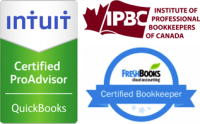Being a tradesperson isn’t easy. The job comes with early mornings and long days spent managing clients, contractors, companies, and suppliers. The last thing you want to do when you come home is think about managing your accounting on top of everything else.
That is why it’s very common for tradespeople to make these 5 avoidable mistakes when managing their books.
1) Fall Into A GST Trap
When registering for GST many tradespeople choose to pay their GST annually. This is a mistake and can really hurt your cash flow in the following year. Rather than wait for your bookkeeping to give you a massive bill that takes an eternity to pay off switch your payments to quarterly.
2) Incorrectly Charging PST
PST isn’t a ‘you’re annoying tax’ that you get to charge your clients when you feel. If you don’t have a valid PST number AND a signed contract stating your client will be paying for the PST you cannot charge PST at all to your clients.
Additionally, according to the BC Government, you can only charge PST in the following circumstances:
- You sell them goods but you don’t install the goods
- You sell them goods and install the goods, but the goods don’t become part of a building or land
- Your customer agrees in writing that you can transfer the tax liability to them. Learn more about this special agreement in Real Property Contractors (PDF).
As a general rule, contractors and tradespeople don’t generally charge clients PST. Instead, you pay the PST when you purchase the materials and you factor that cost into the contract.
If you have incorrectly registered for PST you can close your account by sending a Request to Close a Provincial Sales Tax Account form (PDF) to the Minister of Finance.
3) Throwing Away Receipts
Throwing away your receipts is like throwing away money! You won’t be able to properly claim your expenses which can increase your tax bill. Additionally, if you get audited by the CRA and you don’t have your receipts you could find yourself in a lot of trouble.
Keep a file folder in your truck/van and put all of your receipts inside as soon as you get them. This will help you a) keep your bookkeeper happy b) ensure you charge your clients for all the materials your purchase c) help you come tax time.
4) Not Collecting Deposits
While it would be great to trust everyone and have them maintain that trust by paying their invoice in full and on time, this doesn’t always happen. Having a client fail to pay a large bill can destroy a small business.
That is why we always recommend that you have a proper invoicing system in place, collect a deposit upfront from their clients and invoice your clients regularly and not just at the end of the contract. You can apply incremental amounts of the deposit to each invoice up until the final bill to ensure you don’t get screwed. By invoicing each job in portions as you go you can ensure you get paid before continuing with the next phase of work.
5) Leaving Your Books To The Last Minute!
Now I know that we are a bookkeeping company so this final note may seem a little biased, but SERIOUSLY DON”T WAIT UNTIL THE END OF THE YEAR…OR LATER! A good bookkeeper is going to be extremely busy at this time of year so there may be a wait to be onboarded or the work may cost extra due to rush fees.
We know that if you are reading this post then you are good at building houses, but not good at paperwork and keeping the CRA happy. The sooner you admit this to yourself the better. Hiring a bookkeeper is money well spent. Not only will you be able to sleep at night knowing that the backend of your business is well taken care of you can also know that when the CRA comes knocking because you are the ‘chosen one’ for a random audit you have nothing to worry about.
Contact us today for an obligation free consultation.


